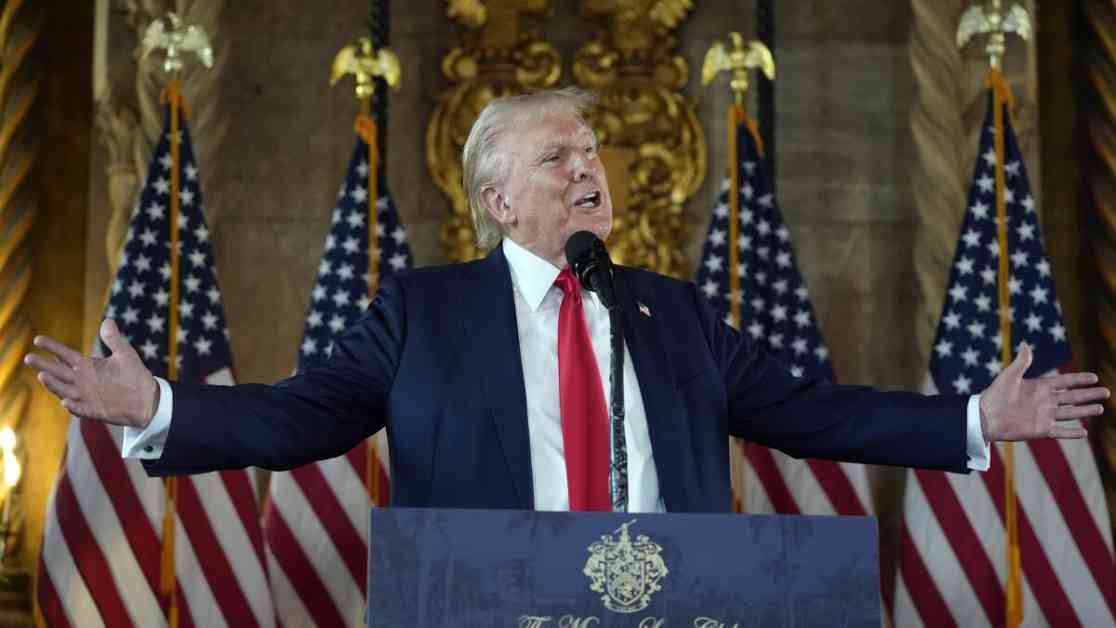**Arizona Prosecutor’s Mistake Halts Trump’s Potential Fifth Criminal Indictment**
The recent developments in the Arizona false electors case have shed light on the legal jeopardy faced by former President Donald Trump and his associates. The filing in this case revealed how close Trump came to being indicted in Arizona, and it underscores the ongoing legal risks for him and his confederates, particularly Rudy Giuliani.
This Arizona case is just one of five brought by state or local prosecutors against individuals who falsely claimed to be “duly elected and qualified electors” for Trump, as well as those who orchestrated the scheme. While only one of these cases, in Georgia, included charges against Trump himself, the Arizona prosecutors have charged 11 fake electors with nine felonies each, along with seven Trump allies who were involved in various post-election schemes.
Former Trump attorney Jenna Ellis recently agreed to cooperate against the other defendants in the Arizona case, signaling potential trouble for the remaining individuals implicated in the scheme. Additionally, fake elector Loraine Pellegrino pleaded guilty to a single misdemeanor count, indicating a willingness among some defendants to cooperate with prosecutors.
If history is any indication, we may see a cascade of similar pleas from other defendants in this case, especially those lower-level players who may hope for a future in Arizona politics and are looking to secure favorable deals by cooperating early on. However, for the higher-level Trump loyalists charged in this case, including Giuliani, Boris Epshteyn, John Eastman, and Mark Meadows, Ellis’ cooperation agreement puts them squarely in the crosshairs.
Ellis, who was deeply involved in the alleged illegal activities, could provide critical evidence against the other defendants, particularly Giuliani, with whom she worked closely. The filing in the case also revealed that the grand jury had considered charging Trump as well, but the prosecutor urged them not to do so, citing the U.S. Department of Justice’s Petite Policy.
The Petite Policy, named after a 1960 Supreme Court case, is a self-restraint that the Justice Department imposes on its prosecutors when dealing with cases that are already subject to state or local prosecution. While the policy is meant to prevent double jeopardy, it should not have influenced the Arizona grand jury’s decision on whether to indict Trump.
Despite the prosecutor’s recommendation against charging Trump, some jurors reportedly expressed a desire to do so, but ultimately followed the prosecutor’s advice and named Trump as “Unindicted Coconspirator 1” in the indictment. This decision has raised questions about the prosecutor’s handling of the case and whether it may have inadvertently misled the grand jury.
The ongoing legal proceedings in Arizona have significant implications for Trump and his associates, who have so far managed to avoid serious consequences for their alleged misconduct. However, with Ellis’s cooperation agreement and Pellegrino’s guilty plea, the remaining defendants may face a tough choice between holding out and risking harsher penalties or cooperating and potentially securing more favorable outcomes.
As the case progresses, additional pleas from the false electors are expected, as they weigh their options and consider the potential consequences of their actions. For individuals like Giuliani, Eastman, and Meadows, who are facing serious charges, the stakes are high, and the prospect of conviction looms large.
The revelations in the Arizona case serve as a stark reminder that the legal challenges facing Trump and his associates are far from over. Despite Trump’s attempts to evade accountability, the multiple criminal cases against him continue to pose a threat to his freedom and legacy.
**The Impact of the Arizona Case on Trump’s Legal Battles**
The Arizona false electors case has significant implications for Trump and his associates, as it highlights the legal risks they face in the aftermath of the 2020 election. With charges brought against fake electors and Trump allies in Arizona, the case has the potential to unravel a web of alleged criminal conduct that could have far-reaching consequences for those involved.
The decision to charge 11 fake electors with nine felonies each underscores the seriousness of the allegations against individuals who sought to undermine the electoral process. Additionally, the charges against Trump allies who orchestrated post-election schemes indicate that prosecutors are not shying away from holding those responsible accountable for their actions.
The recent plea deal by former Trump attorney Jenna Ellis and the guilty plea by fake elector Loraine Pellegrino suggest that some defendants are willing to cooperate with prosecutors in exchange for leniency. This cooperation could prove pivotal in building a case against higher-level Trump loyalists, including Giuliani, Epshteyn, Eastman, and Meadows.
Ellis’s involvement in the alleged criminal activities, particularly her role in Giuliani’s phony “hearing” in Phoenix, positions her as a key witness who could provide crucial evidence against her former colleagues. If her testimony proves credible, it could spell trouble for the other defendants and potentially lead to convictions and prison sentences.
Despite Trump’s efforts to distance himself from the legal troubles facing his associates, the Arizona case serves as a stark reminder that the allegations of election fraud and misconduct continue to haunt him. With the prospect of additional pleas and cooperation agreements, the case could snowball into a broader investigation that implicates more individuals in Trump’s inner circle.
The decision by the Arizona prosecutor to dissuade the grand jury from indicting Trump raises questions about the handling of the case and whether political considerations may have influenced the outcome. While the Petite Policy may have played a role in the prosecutor’s recommendation, it does not absolve Trump and his associates of their alleged wrongdoing.
As the legal proceedings in Arizona unfold, the spotlight on Trump’s legal battles continues to grow brighter. With multiple criminal cases pending against him and his allies, the former president faces a precarious legal landscape that could jeopardize his freedom and tarnish his legacy.
**The Road Ahead for Trump and His Associates**
The Arizona false electors case has brought renewed attention to the legal challenges facing Trump and his associates, as they navigate a complex legal landscape fraught with potential pitfalls. With charges brought against fake electors and Trump allies in Arizona, the case has the potential to upend the political fortunes of those involved and reshape the narrative surrounding the 2020 election.
The recent developments in the case, including the plea deal by Jenna Ellis and the guilty plea by Loraine Pellegrino, signal a turning point in the legal proceedings and underscore the risks faced by those implicated in the alleged election fraud scheme. As more defendants weigh their options and consider cooperating with prosecutors, the case could unravel further, exposing new layers of criminal conduct and potential wrongdoing.
For Trump and his inner circle, the stakes are higher than ever, as the legal challenges continue to mount and the prospect of criminal convictions looms large. With Ellis’s cooperation agreement potentially implicating other defendants, including Giuliani, Epshteyn, Eastman, and Meadows, the pressure is on to secure favorable outcomes and avoid harsh penalties.
Despite Trump’s attempts to distance himself from the legal troubles facing his associates, the Arizona case serves as a stark reminder that the allegations of election fraud and misconduct are not going away. With the potential for additional pleas and cooperation agreements, the case could snowball into a broader investigation that exposes the extent of the alleged criminal conduct.
As the legal proceedings in Arizona play out, the focus remains on Trump and his allies as they navigate a treacherous legal landscape that could have far-reaching consequences. With the specter of prison sentences and convictions looming, the former president and his associates face an uncertain future as they grapple with the fallout from the 2020 election.
In conclusion, the Arizona false electors case has the potential to reshape the legal landscape for Trump and his associates, as they confront the mounting legal challenges and navigate the complexities of the legal system. With charges brought against fake electors and Trump allies, the case has the potential to expose the extent of the alleged criminal conduct and hold those responsible accountable for their actions. As the legal proceedings unfold, the spotlight remains firmly on Trump and his inner circle, as they face a daunting legal battle that could have far-reaching implications for their future.



























